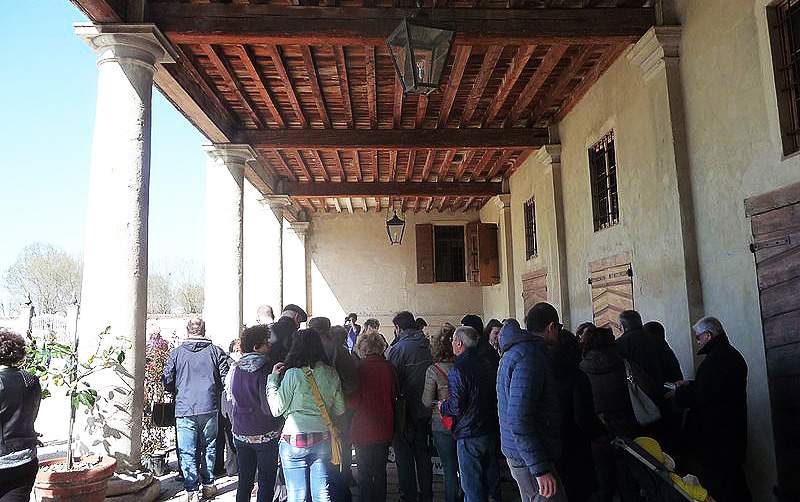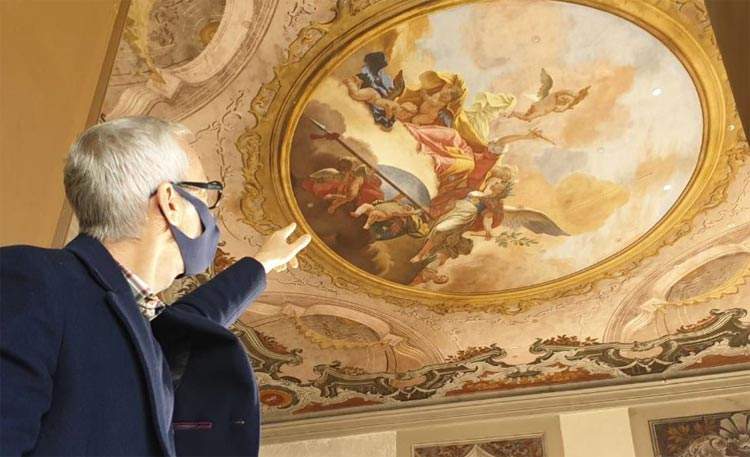FAI Spring Days 2021 have yet to start (the event will be held on Saturday and Sunday) but criticism of the event has already begun for days. It is a situation that always accompanies the flagship event of FAI - Fondo Ambiente Italiano, and even in past years there have been very heated clashes around the Spring Days. Several points are at the center of the discussions each year: the casual use of volunteers to lead the public through the sites (in some editions even young people in school-work alternation), the fact that many places are public sites that open only on the occasion of the event, the usual garnish of praise from the press and institutions (Minister of Culture Dario Franceschini has never made a secret of his great appreciation for the “FAI model” often pointing to it as a reference point: even this year, during the presentation he attended, Franceschini used the much abused expression “new Renaissance” to define the 2021 edition).
This year, in addition, there are also those who consider FAI Days inappropriate at such a delicate moment as the one we are going through. “We really don’t understand,” says the association Mi Riconosci? I am a cultural heritage professional, often critical of the Spring Days, “why at a time when everything should be done to discourage the concentration of visits, RAI and the Ministry aim to promote, still, ’exceptional’ openings and visits. At a time when museums are still trying to reopen, when on weekends there is compulsory one-day advance reservation for every site in the country (even for the tiniest and most remote museum darte sacra), when free Sundays have been cancelled to avoid gatherings. At a time of experimentation, when tour guides are struggling to get back on track at the opening of a season that is complicated to say the least, when we are trying to imagine a new management of tourist flows, less concentrated and better planned.” Can we therefore afford to continue to focus on the model ofexceptionalism? This is what Mi Riconosci asks: “In this moment, of exhausting research and the reconstruction of a new ordinary, more just and sustainable, do we really need the exceptional occasionality of FAI days, with the usual mobilization of volunteers and the usual uncritical media coverage? Do we really still want to tell ourselves that this would be the virtuous model to look to in thinking about the future? Do we really need this celebration now?”
 |
| A photograph taken during the 2017 FAI Spring Days at Villa Saraceno in Finale di Agugliaro (Vicenza). Ph. Credit |
The most vibrant protests are those of tour guides, according to whom the FAI Days are even a denial of the right to work. This is what the unions Confguide and Federagit Confesercenti of Emilia Romagna claim in a note sent to the press. “Also this year,” explain the Emilia-Romagna guides, “the days of FAI - Fondo Ambiente Italiano are repeated and also this year volunteers or students will replace professional tour guides all over Italy and also here in our region Emilia Romagna. At such a dramatic time for cultural tourism where hundreds of Tourist Guides throughout the region are about to face a second summer season without groups, we find absolutely inappropriate and offensive milk of the Fondo Ambiente Italia, an organization that enjoys regular public funding, in continuing this campaign of misinformation where the volunteer can replace the professional.”
The Emilia-Romagna guides criticize the FAI’s method, which is “always the same,” that is, “seemingly inaccessible places are reopened thanks to the intervention of the FAI, a free offer that has very specific figures (so free it is not), students who lend their work for free perhaps because it is provided for in the curriculum, volunteers who for a weekend are convinced they are doing something unique and great.”
Not only that: the guides from Emilia-Romagna also claim that FAI does not shine in its capacity for dialogue, and that the only result of the discussions is the denial of the guides’ right to work: “On several occasions, when allowed, a constructive dialogue was attempted, but even at these meetings there was not the slightest willingness on the part of FAI representatives to seek a solution that could be satisfactory to the different parties. In reality what is perpetrated continuously is the violation of the right to work of Tourist Guides who instead of being involved are literally ignored, as ignored are the rules: to lead groups must be people qualified to the role of Guide against a decent remuneration. Tourist Guides are covered by liability insurance to protect the client and operate in accordance with Covid safety protocols agreed upon with the Emilia-Romagna region.”
“We believe that the FAI,” the Emilia-Romagna guides conclude, “missed the opportunity to give a signal of support to our category that would have benefited its image and the quality of guided tours. Is it not enough to have obtained a qualification valid throughout the country? Is it not enough the years and kilometers spent/traveled by Tourist Guides throughout the country to illustrate the beauty of our artistic heritage? Heritage that could be an extraordinary source of economic and social growth. Can we allow the transmission of our unparalleled values to be entrusted to those without the right training? How can we fail to recognize the years of study, the continuous updates, the experience gained over the years with the respect that every profession deserves? Why do we continue to think that culture should only be voluntary and free?”
From north to south, even in Basilicata local guides have risen up against FAI Days, even going so far as to speak of squatting. The unions ConfGuide, Confcommercio Matera and GTA Basilicata have written a letter to the Matera delegation of the FAI and to the institutions (Municipality and Province of Matera, Region, Archdiocese, Superintendence, National Museum of Matera, Confindustria Basilicata, orders of architects and engineers of the province of Matera, University of Basilicata) to express their disappointment. “The carrying out of guided tours, especially if behind an economic contribution, whether voluntary or ’minimal and suggested,’ as cunningly indicated by the FAI,” say the Lucanian guides, “is possible only and exclusively by those who are in possession of a qualification to the profession of Tourist Guide, a profession regulated and regulated by very precise state and regional laws. Therefore, it is not enough to read a few texts (nor to possess a degree or doctorate) to conduct guided tours. Beyond the legal aspects, moreover, we find that entrusting volunteers with the task of organizing a tourist itinerary and managing the reception of visitors and the guided tour service mortifies the licensed tourist guides who, after having laboriously acquired the skills and obtained the qualifications, as well as those qualifying them for the profession, have opened a VAT number, making these skills a job in which to invest their future.”
The Lucanian guides specify that “We do not want to point the finger at volunteers here, but to remember that the organization and management of a guide service requires professional skills that need a real work contract and, above all, adequate remuneration. Instead, one contributes, in this way, to the very bad message that tour guiding is not a profession, but a hobby for which passion and good will suffice. This stereotypical view, among other things, flows into a model of cultural heritage enhancement and protection that somewhat debases all cultural professions, first and foremost that of archaeologist, which too often are considered superfluous and replaceable with volunteer activities. Architects, moreover, especially younger ones, also find themselves battling mentalities and attitudes that belittle the professionalism they have acquired, both economically and in terms of skills. One would expect, therefore, that the bodies and institutions that train and protect archaeologists and architects would stand in solidarity with tour guides and work to stigmatize such behavior, rather than endorse it or even, as in this case, make themselves party to it.” The Matera guides, like their colleagues in Emilia, also criticize the appropriateness of the FAI Days: “The timing,” they say, “could not be worse. Because of the global pandemic, the tourism sector has been on its knees for a year and a half, and will be for who knows how much longer. The tentative openings in the coming weeks represent, for many operators, the hope of earning some money to pay taxes and daily expenses. Instead, they find themselves subject to unfair and abusive competition from volunteer associations, which show a disarming lack of sensitivity.”
 |
| Tour Guide |
Also holding court this year is a case that has been pointed to in recent days as the perfect example of why the FAI Days model can hardly be taken as a reference: that of Sammezzano Castle. The celebrated Tuscan monument, located near Reggello, has been in the rankings of Europe’s most endangered sites for years, and would need major restoration work so that it could be made permanently visitable. Instead, the FAI chose the easy way out: that ofopening to the public on just two days, when the castle would, if anything, need to be taken care of. And the bookings sold out in a very short time: ending on the same day that the announcement was made that Sammezzano would be included in the FAI Days sites.
The Save Sammezzano Committee, which has been working for a long time for the castle to be recovered, has expressed very sharp criticism of the attitude that the FAI (but also the media) has had towards the news of Sammezzano’s inclusion in the places open during the FAI Days: according to the association, it is a means of distraction from the real problems of the site. “The press media,” the committee writes in a note, “have (rightly) spread the news that Sammezzano will be open for visits on May 15 and 16 on the occasion of the FAI Days; however, in none of the articles published is there any reference to the structural situation in which it is located and the need to recover it: there is only mention of the possibility of being able to see it. There you have it that, unconsciously, a dangerous distraction tool has been activated so that people are mainly asking to visit it, rather than strongly calling for its recovery. The problem of Sammezzano is certainly not visitation, this is something we want to emphasize. But even before sporadic visitation, however, we must strive to obtain its restoration and accessibility to all. Wouldn’t it be wonderful if one day Sammezzano could be regularly visited by everyone in its full beauty, instead of being seen occasionally by the privileged few who manage to book themselves through a Click Day? We want recovery and regular usability for the benefit of all, not occasional visitability for the benefit of the lucky few!”
The committee also let it be known that it has suffered numerous complaints via e-mail from people who, interested in visiting the Castle, were unable to book because the places had already run out. But the committee had nothing to do with it: “The visits according to this mode,” Save Sammezzano explains, “were anidea of FAI - Fondo Ambiente Italiano, and also the available places were assigned through their website.” He reiterates, “It is very important not to forget that Sammezzano’s main need is to be restored and not visited. Of course, visits are welcome if they serve to raise economic resources to invest immediately in the restoration of the structure. If the economic resources collected on such occasions are not immediately spent on interventions to restore the castle, then it clearly means that they are not directly benefiting Sammezzano, as they should be.” Today, Save Sammezzano concludes, “the kind of visibility that Sammezzano needs most is the one derived from initiatives aimed at keeping the spotlight on its structural situation and the need to intervene as soon as possible with concrete recovery actions. So let’s not focus too much on its visitability if this does not go hand in hand with its restoration; otherwise we risk getting unintentionally distracted from the more urgent need.”
 |
| The Hall of the Lilies at Sammezzano Castle (from Save Sammezzano website) |
 |
| Harsh criticism of FAI Days: "inappropriate and offensive" at this time |
Warning: the translation into English of the original Italian article was created using automatic tools. We undertake to review all articles, but we do not guarantee the total absence of inaccuracies in the translation due to the program. You can find the original by clicking on the ITA button. If you find any mistake,please contact us.